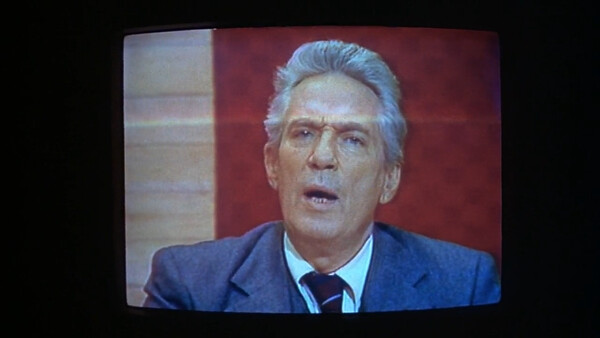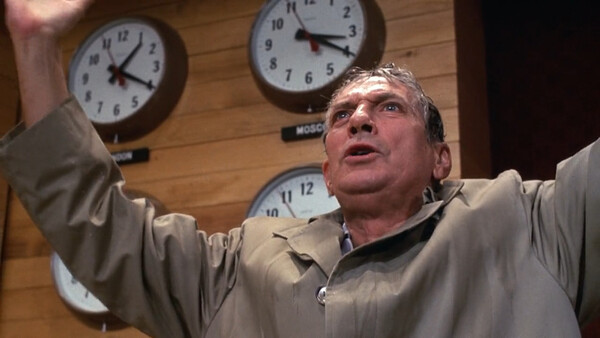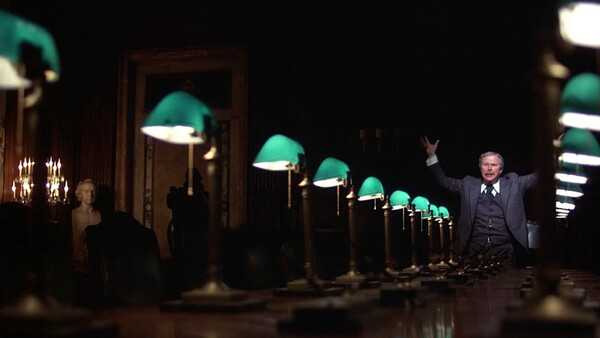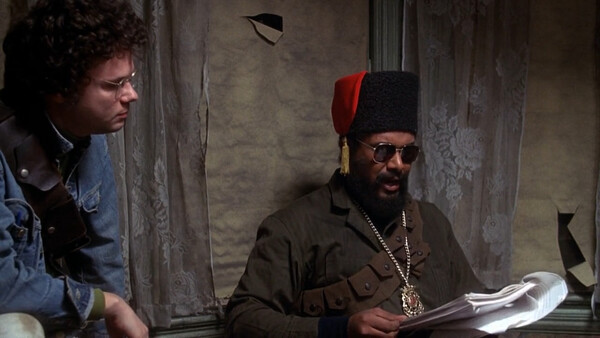The corrupting influence of television in Network
Introduction
Sidney Lumet's 1976 classic Network ends with a blunt summary of its plot: "This was the story of Howard Beale, the first known instance of a man who was killed because he had lousy ratings." While the life and death of network news anchorman Howard Beale (played by Peter Finch) is certainly an important part of the film, it's telling that Beale's actor is third billed in what is ostensibly his own story. Howard, along with most of the other characters in the film, is simply along for the ride, unable to influence or control the true focus of the film: the destructive power of television.

The film starts on a macabre note. Howard Beale, a newscaster past his prime working for failing television network UBS has just been fired—effective in two weeks. Howard's old friend and head of the news department at UBS, Max Shumacher (William Holden), breaks the news to him, and they both go out to get "properly pissed." Max relates a story from his youth in which a cab driver mistakenly assumes he is suicidal as he rushes to get to an on-site newscast from the middle of the George Washington bridge. The two friends' uproarious laughter fills the dark New York City street. This suicide as entertainment bit is echoed later, as a morose Howard claims "I'm gonna blow my brains out right on the air. Right in the middle of the 7:00 news." Max replies "Well, you'll get a hell of a rating."
The next day Beale repeats the same statement, this time on live television. The world is shocked and appalled. Reporters surround the UBS building. Phones ring off the hook with complaints about foul language. Howard is hauled into the office of network executive Frank Hackett (Robert Duvall) and told that he's off the air effective immediately. He begs to be allowed one last show, to apologize and make a farewell statement, and the boss eventually acquiesces to his pleas. Once he's live, however, instead of gracefully retiring with a dignified apology, he goes berserk, telling audiences in graphic terms that he is fed up and has nothing more to say.
Management is furious, but one woman sees a lucrative opportunity in the scandal: the young and ruthless head of programming Diana Christensen, played by Faye Dunaway. She has a single-minded devotion to creating a hit program to bring the network out of its slump, no matter the social or moral implications. "Audience share and ratings are the alpha and omega of her existence."1 She is, as Max later pointedly observes, "television incarnate." She sees the ratings shoot up thanks to Beale's new persona, and convinces Hackett to keep him on.
At this point Howard experiences some kind of spiritual vision—or perhaps he just has a mental breakdown, the film is deliberately ambiguous on this point. Either way, he hears a voice tell him to go on the air and preach the truth to the people. "We're not talking about eternal or absolute or ultimate truth," the voice says, "we're talking about impermanent, transient, human truth." So that's what he does.
The corruption of the prophet
When Howard gets back on the air, he begins an angry tirade against the madness and injustice of the modern world. "Open the window, stick your head out and yell: 'I'm mad as hell, and I'm not going to take it any more!'" he commands his audience. "Howard Beale is, indeed, a modern Moses, telling us that we are in bondage to the TV slave masters, who in turn crack the whip at the bidding of Exxon, Dupont, and other multinational Pharaohs."2

Audiences love it. As ratings continue to rise the network executives give Beale his own show with other eccentric personalities. He is introduced as the Mad Prophet of the Airwaves, and preaches his gospel to a live studio audience. But things take a turn for the worse when Beale turns his righteous anger towards the very institution that is that is supporting him: television. "Television is not the truth. Television is a goddamned amusement park," he says. "You're beginning to think the tube is reality and that your own lives are unreal." For his sin of attempting to expose the evil influence of television the prophet is summoned before Arthur Jensen, the the chairman of UBS's parent company.
The conference room where they meet is huge and dark, designed to evoke an "overwhelming cathedral".3 Jensen calls it Valhalla. As theologian Clifford Elliott observes, "The movie shows in a disturbing way how religious and liturgical the business world can be."2 In contrast to Howard's earlier spiritual vision, which was personal and silent (at least to us viewers), this religious experience is terrifying and deafening. Jensen is framed equally as a hellfire preacher, pointing his finger from the end of the table and roaring "You will atone!", and as a devil, slinking through the darkness, partially obscured by a row of green desk lamps. Beale is tempted by the devil's slick words, and eventually succumbs to them. "I have seen the face of God" he cries, to which Jensen replies "You just might be right."

From that night on Howard Beale preaches the corporate cosmology of Arthur Jensen. Television and its masters—IBM, ITT, AT&T, Dupont, Dow, Union Carbide, and Exxon, to name a few—have corrupted even Howard Beale.
Television as a poisoned chalice
Howard Beale was not particularly attached to any great cause or political philosophy before his "cleansing moment of clarity," he was simply an ordinary, average man. In fact, writer Paddy Chayefsky specifically struck lengthy passages from Burton Wohl's official novelization of the film that describe the character's values and strengths. "In the right-hand margin, a perplexed Chayefsky wrote, 'What's this shit got to do with anything?'"4 Howard represents the average person's outrage: he doesn't know what to do about the depression or the Russians or the crime on the street, he's just mad as hell. Despite his honesty and simplicity the dehumanizing power of television ruins him, eventually costing him his life.
Even those who already have strong beliefs and convictions are not immune, like hardcore communist leader Laureen Hobbs. At first she cares only about her political cause, going on about the struggle of the oppressed masses and criticizing the Ecumenical Liberation Army (based on the real-life Symbionese Liberation Army1) for being too radical. But all this changes when she becomes involved with UBS.
Hobbs is tempted by the offer of being able to reach millions of Americans on a weekly basis in a drama series proposed by Diana Christensen. The next time we see her and the Ecumenicals they're pouring over paperwork with a bunch of lawyers, arguing about distribution charges and subsidiary rights. "In the end, it is they who agree to kill Howard Beale, the mad prophet, with whom they should have had so much in common."2 The scene is echoed in Arthur Jensen's monologue: "What do you think the Russians talk about in their councils of state? Karl Marx?" These idealists and radicals are just as susceptible to the allure of money and power as everyone else.

And viewers like you
If the institution of television can so effectively destroy and subjugate those who produce it, what hope do mere consumers have to resist? None, the film seems to say.
Diana is contrasted against her much older lover Max. They come from different generations, and although she is also involved in the production of television her role in the film is to represent the generation raised by the tube. When confronted with the suffering and death of other human beings she sees only opportunities to gain power and money. Even while being intimate all she can talk about is work. "She is exploitative and unfeeling in a world already so insincere, and a walking embodiment of the worst qualities of the so-called 'television generation.'"5
The film does not present much of a hope for the future. As Howard says to his audience, "You do whatever the tube tells you. You dress like the tube, you eat like the tube, you raise your children like the tube, you even think like the tube." Jensen might be right when he argues that the global system of systems—of television presenting packaged corporate propaganda as ultimate truth to the dehumanized masses—is eternal and unstoppable.
Network's legacy
Network opened to general critical acclaim, but some reviewers saw it as a "paranoid", "heavy-handed", or "wickedly distorted" version of reality.1 Perhaps they have a point. It certainly seems hypocritical to use the corrupt and commercialized medium of film to attack television for being corrupt and commercialized. To the filmmaker's credit, they go to great lengths to separate Network from the institution it criticizes. Like many of Sidney Lumet's other films—and in contrast to all TV shows depicted in it—the film has no score, featuring only vérité sound.6 Likewise, writer Paddy Chayefsky saw the role of storyteller as simply "that of a man telling a story that might seem occasionally hard to believe but did in fact happen."4 The two men wanted merely to present a story in an honest and believable way.
The powerful confrontation between Jensen and Beale in the conference room was originally intended to be filmed in the boardroom of the Wall Street headquarters of the New York Stock Exchange. In an unintentionally revealing move, the Exchange withdrew permission to use the room after reading the script for the scene.3 Perhaps they felt the scene hit a little too close to home, as Jensen argues in favor of enslavement to the "international system of currency." In any case, as the world grows smaller and mass media plays an increasingly important role in everyday life Lumet and Chayefsky's vision seems more real today than ever.
References
- Trier, James. 2006. "'Network': Still 'Mad as Hell' After 30 Years." Journal of Adolescent & Adult Literacy 50 (3): 232–36.
- Elliott, Clifford. 1977. "Network: A Film Critique." Theology Today 34 (1): 73–76. https://doi.org/10.1177/004057367703400109.
- Itzkoff, Dave. 2014a. "Chapter 4. The Daily Parade of Lunacies." In Mad as Hell: The Making of Network and the Fateful Vision of the Angriest Man in Movies, by Dave Itzkoff. New York: Times Books.
- Itzkoff, Dave. 2014b. "Chapter 5. A Storm of Humanity." In Mad as Hell: The Making of Network and the Fateful Vision of the Angriest Man in Movies, by Dave Itzkoff. New York: Times Books.
- Alaska, Rosie. 2018. "'Network''s Diana Christensen: Indifferent to Suffering, Insensitive to Joy." Celluloid Sisters. https://celluloidsisters.com/networks-diana-christensen-indifferent-to-suffering-insensitive-to-joy/.
- Hubbert, Julie. 2003. "'Whatever Happened to Great Movie Music?': Cinéma Vérité and Hollywood Film Music of the Early 1970s." American Music 21 (2): 180–213.